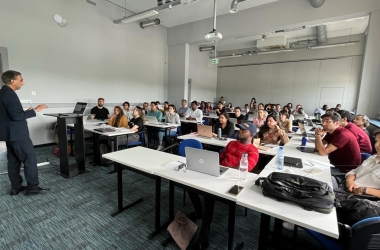End-of-year WUAS Poll Reveals a Few Surprises

WUAS Poll Reveals Surprises
The COVID-19 pandemic is not yet fully eradicated but the silver lining is that it reveals human ingenuity, innovativeness and perseverance to overcome calamity, to thrive and to continue prospering. For higher education, it was an opportunity to show that universities can transform and adapt flexibly for the sole purpose of not stagnating the education of the younger generation. At WUAS, to assess the sentiments of students and staff in relation to education post COVID-19, an online poll was carried out in June before the end of the academic year. The results of the poll were mostly as expected, though there were a few surprises.
The short poll was participated by faculty and students from all of Wittenborg’s study locations in Apeldoorn, Amsterdam, Munich and Bad Voslau. The aim of the poll was to seek students’ and faculty’s opinions about teaching and learning at Wittenborg for the purpose of quality and process improvements. The results of the poll were compiled in a report which will be presented to Wittenborg’s Education Board. Here is a synopsis of some of the results of the poll.
Compulsory Physical Attendance
For face-to-face learning, the majority of teachers who responded (80%) believe that physical class attendance should be made compulsory, while among students, only 34% agree, with the remainder either disagreeing (40%) or are neutral (26%). However, despite this disagreement of compulsory physical class attendance for students, the majority of them (65%) acknowledge that physical class attendance helps them learn and understand lessons better. Those students who agree with compulsory attendance gave the reasons that they understand the lecture better in a classroom setting, that group work is more effective in classroom than online, and that it provides opportunities for better interaction among teachers and students. For teachers, physical class attendance enables students to learn not only from the lecturer but also from their diverse and multi-national classmates. It also provides the lecturer with a better sense of where all students are and this way lecturers can adapt the teaching methodologies to optimise their learning experiences.
For students who disagree with compulsory class attendance, this is where the surprise emerges. More than a third of the students stated that they live very far away from the Wittenborg campus and travelling there costs them both time and money. This is a surprise finding, as Wittenborg always ensures that students are provided accommodation as near to the campus as possible. A quarter of them said that they have job obligations, some have family obligations while about a quarter said they prefer to study online. In response, President of Wittenborg Peter Birdsall said that at Wittenborg, “we believe in providing a total experience to students, especially international students. This entails attending classes physically, participating in group work and working on projects within Wittenborg or in collaboration with external organisations”. He also would like to remind international students that one of the conditions of their student visa is attending their university courses full-time, rather than working. This would mean they have to follow the institutions’ timetabled study programme and mode of studying. Thus, attending classes physically is of prime importance in terms of the law and it is a signature Wittenborg policy.
To the open question of ‘How can Wittenborg ensure experiential learning and provide an optimal environment for this purpose?’, both students and faculty gave a variety of suggestions. For students, apart from recommending that teachers should have a vast background knowledge and contemporary as well as practical experience, they should be more supportive of students in terms of providing encouragement and moral support. They should also pay more attention to students with regards to their study progress and especially to those who are not able to cope well with their studies.
Both teachers and students recommend that there should be less theory and more practical experiences so that they can learn and understand how businesses actually work in real life. They suggest more collaborations with external organisations, such as real companies, other higher educational institutions and professional bodies, for projects or for school trips. Teachers also suggest bringing in more gamification into the lessons, business case study analysis, other interactive and simulation software, as well as game theory type of problem solving/consultancy projects.
According to Wittenborg’s Assurance of Learning manager, Kriszta Kaspers, “although we define at a programme level what type of competencies and skills our students should have upon graduation, here enters the crucial role of teachers and the importance of teachers deciding in which form they decide to deliver their classes and what didactical methods they choose to employ in their teaching. It’s true that teachers have a prescribed set of aims and objectives per module; however, they have the flexibility and encouragement of WUAS to choose innovative teaching methods that are inspiring and make the learning experience memorable for students, such as gamification or regularly inviting knowledgeable guest lecturers in class delivery”.
The results of the poll will help Wittenborg chart its next academic year plan. As a preliminary step, Wittenborg will bring back 75% compulsory attendance for bachelor's students. More of next academic year’s plan will be announced in the next few weeks.
WUP 17/07/2022
by Hanna Abdelwahab
©WUAS Press